
In today’s hyperconnected digital economy, choosing the right cloud platform isn’t a technical decision—it’s a strategic business one. With over 90% of global enterprises adopting cloud or hybrid infrastructure, the selection between Microsoft Azure and Amazon Web Services (AWS) can significantly influence cost efficiency, scalability, security, and compliance.
Both platforms are leaders in the Gartner Magic Quadrant for Cloud Infrastructure and Platform Services, but each has distinct strengths based on your enterprise’s roadmap—whether you're migrating legacy systems, building AI/ML products, or scaling a global digital footprint.
This guide delivers an executive-level breakdown of AWS vs Azure from the lens of enterprise IT leaders. We’ll unpack key differences in compute, cost, hybrid readiness, developer ecosystems, and industry-specific use cases—empowering you to align your cloud strategy with long-term business goals.

- The Cloud Dilemma That Shapes Enterprise Innovation
- Azure: Built for Microsoft-Centric and Hybrid Enterprises
- Key Enterprise Features of Microsoft Azure
- Benefits of Microsoft Azure
- AWS: Cloud-Native Innovation at Scale
- Key Enterprise Features of AWS
- Benefits of AWS
- Azure vs. AWS: In a Glance
- Detailed Comparison: Azure vs AWS
- Choose Azure if
- Choose AWS if
- Why Enterprises Trust TRooTech
- AWS or Azure—Choose Cloud with Confidence
Azure: Built for Microsoft-Centric and Hybrid Enterprises

If you’re searching for cloud services and products, Microsoft Azure is the most grown cloud-based platform. Being a market leader, Microft’s Azure has created an ideal technological foundation for all.
Unsurprisingly, it has also got featured in Gartner’s most recent Magic Quadrant for Cloud Infrastructure and Platform Services.
Azure is an industry-leading cloud computational platform that entered the market in 2008 with an open-source nature. It is available for Windows and caters to various frameworks, tools, programming languages, and operating systems.
Embarking on a cloud frontier, Microsoft Azure got introduced in the market around 2010, offering ‘limitless computational’ power. Considered the largest commercial cloud platform, Azure covers all areas of need in a Microsoft-specialized cloud enterprise. According to recent stats, Microsoft Azure covers 95% of Fortune 500 Companies, serving an established track record across various industries.
Are you planning to switch to a cloud or hybrid cloud environment?
We will guide you through the smooth ways to transform Enterprise Product Development.
Key Enterprise Features of Microsoft Azure
Hybrid Cloud Enablement
Azure’s hybrid capabilities, led by Azure Arc and ExpressRoute, allow enterprises to manage on-premise and cloud environments through a single control plane. This ensures seamless workload portability, enhanced governance, and compliance—making it ideal for industries with strict data sovereignty and business continuity mandates like BFSI and healthcare.
Integrated DevOps & Tooling
Azure natively supports DevOps through deep integration with GitHub, Azure Repos, Pipelines, and Visual Studio. Enterprise teams can automate CI/CD pipelines, manage IaC (Infrastructure as Code), and streamline development lifecycles—accelerating release velocity while maintaining secure, traceable, and collaborative engineering processes across distributed teams.
Scalability & Performance
Azure supports enterprise-scale applications through auto-scaling VMs, App Services, and Kubernetes clusters, deployed across 60+ global regions. This ensures optimal workload performance under varying demand, with low-latency access, built-in redundancy, and capacity elasticity—critical for modern digital platforms with unpredictable usage patterns.
Enterprise Security & Compliance
Security is embedded at every layer with Azure. Tools like Azure Sentinel (SIEM), Defender for Cloud, and 256-bit encryption protect enterprise workloads. Role-based access control, threat detection, and integrated compliance tracking make it suitable for regulated industries handling sensitive data and requiring audit-ready security postures.
ML & Analytics Ecosystem
Azure empowers data-driven innovation with services like Synapse Analytics, Azure ML, and Databricks. Enterprises can operationalize predictive models, unify big data pipelines, and run advanced analytics at scale—all while maintaining governance and cost control, critical for financial forecasting, customer insights, and supply chain optimization.
“95% of Fortune 500 companies trust Azure for mission-critical workloads due to its hybrid compatibility and Microsoft-native ecosystem.”
Benefits of Microsoft Azure
Seamless Migration for Microsoft-Heavy IT Stacks
Azure offers native compatibility with Microsoft technologies like Active Directory, SQL Server, and Office 365, making it the ideal cloud platform for enterprises already invested in the Microsoft ecosystem. This reduces migration complexity, preserves licensing value, and accelerates cloud adoption without disrupting existing business operations or integrations.
Lower Latency Through Global Data Centers
With 60+ cloud regions and a vast CDN footprint, Azure ensures ultra-low latency and high availability across geographies. Enterprises with globally distributed users benefit from improved application responsiveness and business continuity while remaining compliant with local data residency and regulatory requirements.
Governance-Ready Cloud with Regulatory Compliance
Azure embeds governance at scale through Azure Policy, Blueprints, and Defender. It meets compliance mandates such as HIPAA, GDPR, FedRAMP, and ISO 27001, making it a trusted choice for enterprises in healthcare, government, and finance managing sensitive workloads and audit-intensive processes.
Optimized Cost Control Through Hybrid Benefits
Azure Hybrid Benefit and Reserved Instances allow enterprises to reuse existing on-premise licenses and forecast long-term costs with confidence. This ensures cloud economics align with enterprise procurement strategies, enabling cost-effective scaling without surprise billing.
Built-In Business Continuity and Disaster Recovery (BCDR)
Azure Site Recovery and paired region architecture offer robust, automated failover and data replication capabilities. Enterprises can achieve near-zero RPO/RTO, ensuring service resilience and operational continuity even during regional outages, cyber incidents, or natural disasters.
Want to Build a Resilient Hybrid Cloud Framework?
Talk to our Azure-certified architects for a transformation blueprint.
AWS: Cloud-Native Innovation at Scale

In the cloud battle, a surface-level glimpse might confuse us about the fact that AWS has the largest share of consumers worldwide. Indeed, the fact is true, but we must dive into detail to understand the same.
Amazon Web Services, in short AWS, is a subsidiary of Amazon.com, Inc. This is one of the greatest cloud platforms that is successfully running in the world of online retail businesses. With a wide selection of services to enterprises, AWS caters to almost everyone.
Considered the private cloud service provider for Amazon employees, AWS was launched in 2006 as an internal cloud service provider for companies. Grown the most matured cloud service platform, new versions like Amazon S3 Data Storage and Elastic Cloud Computing (EC2) were made available to the public. Today, from big fortune firms to small SMEs, every organization uses AWS Consulting Services to meet the needs of its users.
Key Enterprise Features of AWS
Compute Power
AWS offers unmatched elasticity through services like EC2, Lambda, and ECS, enabling enterprises to run scalable workloads, microservices, and serverless applications. These services adapt to changing demand in real-time, reduce infrastructure overhead, and accelerate deployment for everything from enterprise-grade SaaS to AI-driven platforms.
Security & IAM
AWS provides a robust, zero-trust security architecture via Identity and Access Management (IAM), KMS encryption, AWS Shield (DDoS protection), and multi-factor authentication. These enterprise-grade tools enforce granular control, mitigate threats, and support compliance across regulated environments such as finance, healthcare, and critical infrastructure.
Global Availability
With 99 availability zones across 30+ regions, AWS enables low-latency, fault-tolerant applications globally. Enterprises benefit from geo-redundant infrastructure that supports regional compliance and ensures business continuity. This scale is ideal for multinational operations requiring consistent performance and resilience across user bases and workloads.
Developer Ecosystem
AWS equips developers with an end-to-end DevOps toolchain, including CloudFormation, CodePipeline, CodeDeploy, and SDKs across multiple languages. These tools accelerate infrastructure automation, CI/CD workflows, and release cycles—empowering engineering teams to build, test, and deploy enterprise-grade solutions with speed and confidence.
AI/ML Leadership
AWS leads the market in AI/ML infrastructure with services like SageMaker, Lex, Polly, and Comprehend. Enterprises use these tools to build intelligent applications, automate decision-making, and extract insights from unstructured data—driving innovation across sectors including eCommerce, fintech, healthcare, and customer experience.
“Startups using AWS launch products 3x faster with up to 60% lower TCO compared to traditional infrastructure.”
Benefits of AWS
Ideal for Fast-Scaling, Cloud-Native Enterprises
AWS is purpose-built for businesses looking to scale rapidly. Its on-demand infrastructure, modular services, and serverless computing capabilities allow enterprises to launch, iterate, and scale products globally without provisioning delays—making it ideal for startups, SaaS providers, and digital transformation programs in hyper-growth mode.
Extensive Open-Source Support
AWS maintains broad compatibility with open-source technologies such as Kubernetes, PostgreSQL, Python, and Linux distributions. Enterprises benefit from the flexibility to run diverse tech stacks without vendor lock-in, empowering IT teams to innovate using best-fit frameworks, libraries, and third-party integrations across modern application architectures.
Enterprise-Ready Services with Usage-Based Billing
AWS offers granular billing with no upfront commitments. Enterprises can pay only for the resources used, optimizing cloud spend while scaling services in real time. This consumption-based pricing model supports dynamic budgeting and financial forecasting—critical for CFOs managing large-scale cloud adoption across departments and regions.
Global Redundancy and High Availability
With 30+ regions and 99 availability zones, AWS ensures high availability, regional failover, and data durability. Enterprises operating across multiple geographies benefit from fault-tolerant architecture, data residency compliance, and continuous service uptime—making it a preferred choice for global platforms requiring maximum operational resilience.
Innovation Velocity with Advanced AI/ML and IoT
AWS accelerates enterprise innovation through a rich portfolio of AI/ML services (SageMaker, Rekognition) and IoT frameworks. These enable predictive analytics, intelligent automation, and connected device management, allowing businesses to launch cutting-edge products and gain a competitive advantage in manufacturing, logistics, retail, healthcare, and more.
Looking to Scale Your Cloud-Native Products?
Hire certified AWS architects for your next migration or greenfield build.
Azure vs. AWS: In a Glance
| Feature | Microsoft Azure | Amazon Web Services |
|---|---|---|
| Launch Year | 2010 | 2006 |
| Hybrid Cloud | Yes (Azure Arc) | Limited |
| PaaS | Azure App Services | AWS Elastic Beanstalk |
| Pricing Model | Subscription + Usage | Usage-Based (Granular) |
| Storage Options | Blob, Disk, Archive | S3, Glacier, EBS |
| AI/ML Stack | Azure ML, Cognitive API | SageMaker, Lex, Polly |
| Security | Azure Sentinel, Key Vault | AWS Shield, IAM, KMS |
| Developer Ecosystem | Visual Studio, Azure DevOps | CloudFormation, CodeStar |
| Marketplace | Azure Marketplace | AWS Marketplace |
Explore our Cloud Engineering Services to see how we deliver enterprise-scale cloud transformations
Need Us to Review Your IT Product?
Detailed Comparison: Azure vs AWS
Though both Azure and AWS are significant global leaders in cloud computing, each has a glorious history of market dominance, innovation, and excellence. With this, both have proved to be super dynamic platforms in today’s technological foundation. Moreover, the common saying of Gartner’s Magic Quadrant for Cloud Infrastructure and Platform Services suggests, “Both Microsoft and Azure have emerged as leaders in the cloud frontier.” Now, after having a glimpse at the basic comparison, let’s look into the detailed differences between the two.
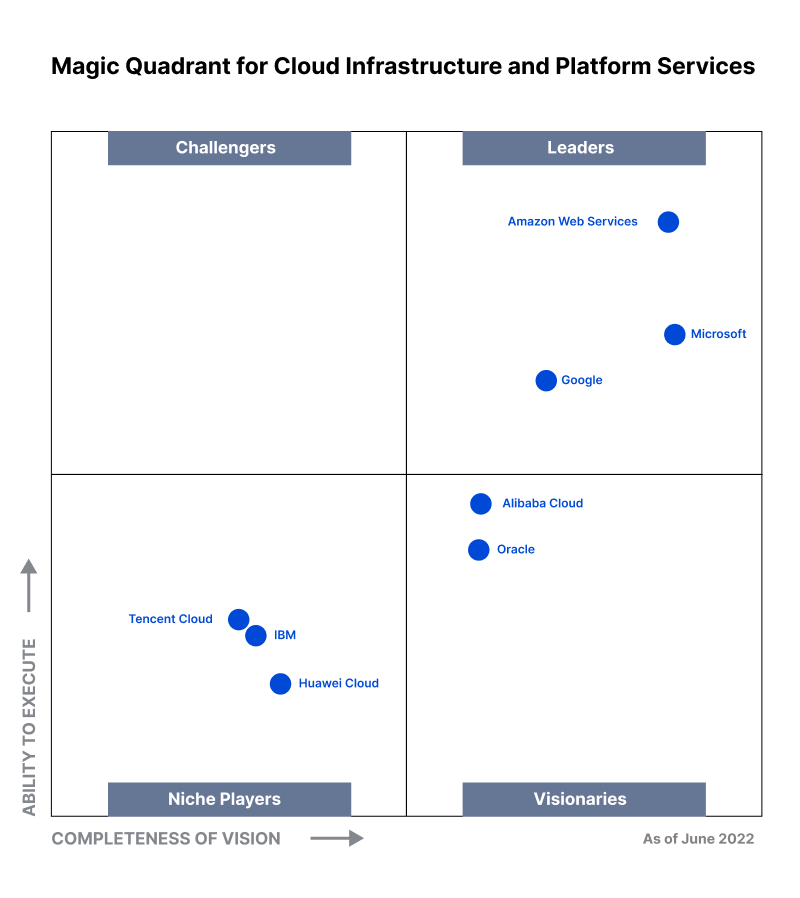
Fig: According to the above chart, the Magic Quadrant is categorized into four quadrants, namely-
i.) Leaders: AWS, Microsoft Azure, and Google Cloud show a strong ability for execution and comprehensive vision.
ii.) Challengers: These companies have a strong ability to execute but a less comprehensive vision as compared to the leaders.
iii.) Visionaries: Companies like Alibaba Cloud have a proper vision with an innovative approach but face challenges in executing their complete strategies.
iv.) Niche Players: Companies like IBM, Oracle, and Tencent Cloud focus on specific niche offerings. But unfortunately, they lack resources or market presence like large players.
A. Compute & Scalability
Azure: Virtual Machines with Autoscaling + Hybrid deployments through Azure Stack.
AWS: Elastic Compute Cloud (EC2), serverless (Lambda), and high-speed performance for real-time analytics.
B. Security & Compliance
Azure: Best for enterprises under strict compliance (HIPAA, GDPR) with built-in governance.
AWS: Strong zero-trust architecture for startups and mid-sized companies scaling rapidly.
C. Developer Support
Azure favors Microsoft ecosystem developers (C#, .NET, Visual Studio).
AWS supports broader languages and has a stronger open-source community backing.
D. Pricing Models
Azure: Better for enterprises leveraging Microsoft licensing—predictable subscription pricing.
AWS: Ideal for startups or MVP launches with granular control and no upfront costs.
E. Storage & Data Models
Azure: Integrated storage tiers with compliance, analytics, and enterprise-grade redundancy for hybrid environments.
AWS: Highly scalable object storage with automation, hybrid support, and lifecycle optimization features.
Tip for Decision-Makers:
If you’re integrating with legacy Microsoft systems or Office 365, Azure offers deeper synergy. If you're building new digital products from scratch, AWS provides broader flexibility.
Compute Feature Parameters
The cloud lords, Azure and AWS are revolutionizing the product marketplace in the IT domain. Hence, deciding which is the best among the two is really a complex task. Scroll down to get an idea about the defined roles and functionalities.
‘Compute’ should be the first concern of any cloud provider before starting its journey. Selecting the right configuration will help maintain the platform's performance and speed. In response to the transition of operations to the cloud platform, competition among businesses like Azure Cloud Services and AWS has intensified significantly. Both these two platforms are on a toe-to-toe race for bringing in new innovative implementations, enhancing customer experience and satisfaction.
The computing platform for Microsoft Azure is based on an open-source Virtual Network, while the pre-eminent computing service for Amazon is EC2. Both these help to auto-scale and accelerate processing for optimized workloads and ensure the dynamic performance of the networks.
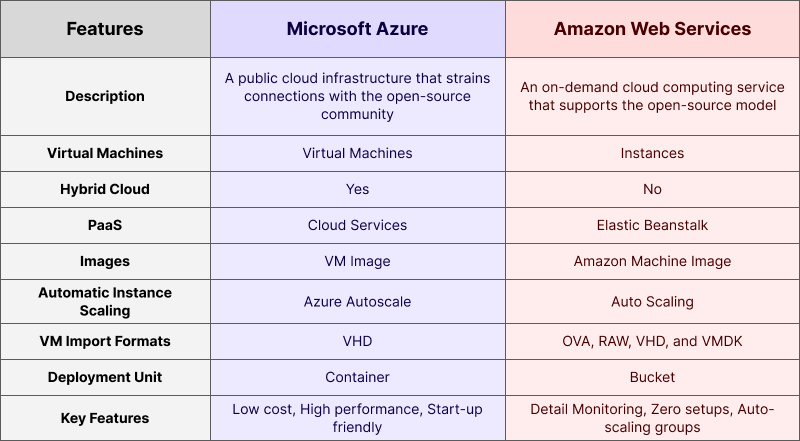
Popularity Check & Market Share
Amazon tops the league with the highest market share, followed by Microsoft Azure. While Azure enjoys 18%, consecutively, Amazon enjoys a market share of more than 30%. Hence, Amazon continues to dominate the cloud infrastructure industry.
To be more specific, the Gartner Market Curve for infrastructure and services, 2021, puts AWS ahead of Azure. Again, according to the Statista reports of 2022, Azure’s hold on the market was 23%, and the computing share of AWS was around 33%. Hence, it can easily be viewed that the cloud platform grew 35% and will expand further by 2027 with a CAGR of 17.9% to $1249.9 Billion.
Despite the gigantic stature of AWS, revenue earnings from the 4th quarter of 2021 were only around $13.5 Billion. At the same time, Azure posted a revenue mark of $17.7 Billion. Henceforth, it’s evident that both these platforms have a pretty fair market share than the other cloud providers.
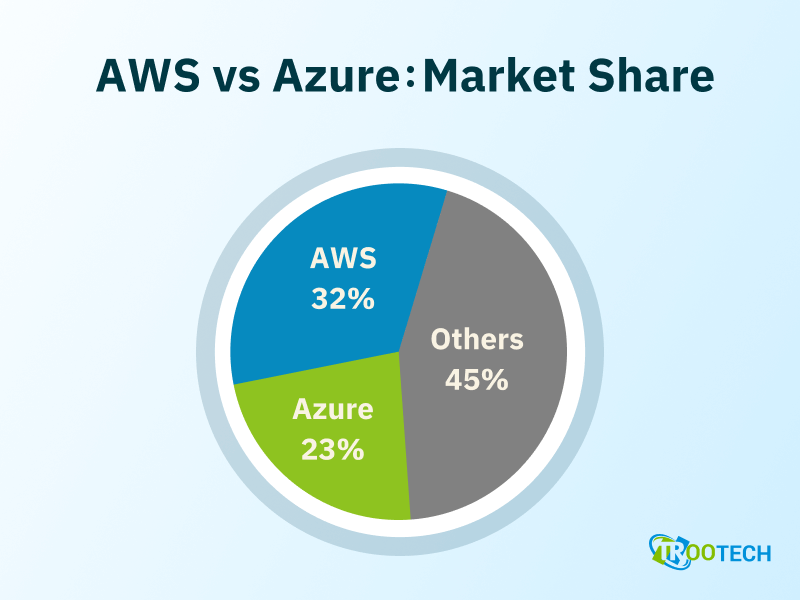
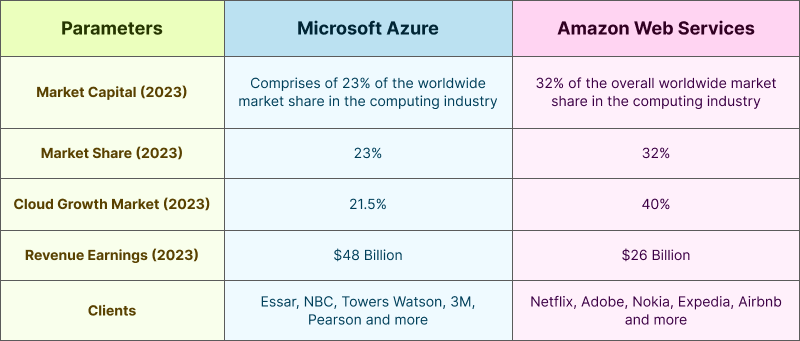
Region-Specific Availability
The global cloud infrastructure of Azure and AWS has data centers interconnected through fiber optic and undersea cable systems. Hence, both platforms span multiple countries, regions, continents, and locations. Azure and AWS depict the faster growth of cloud computing platforms with several collaborators worldwide. So, based on network connectivity, both cloud providers are extremely competitive.
Azure Cloud Services is a great alternative source of cloud platform, used best for business cases. All the solutions are customized for Microsoft-centric businesses that extrapolate beyond business enterprises. It majorly allows users to build private networks using VNET. On the other hand, AWS is mostly used in notable organizations, including NGOs, academic institutions, governmental organizations, and more. The users of AWS can build separate networks using VPC in the cloud. Hence, regarded as the ‘Most Matured Platform,’ AWS Cloud Consulting Services has grown as an all-dimensional catalog that recorded maximum scores in reliability in a short span.
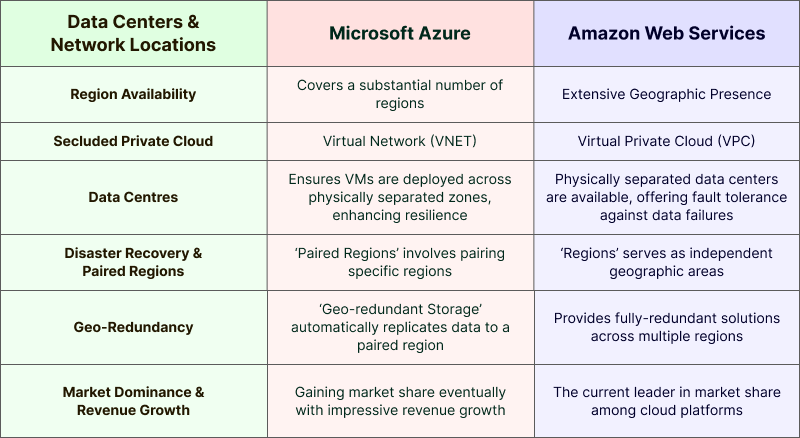
Database & Storage
Foundationally both the platforms, Azure and AWS Consulting Services include a wide range of capabilities, this is why these two tech giants dominate the cloud computing industry. Azure and AWS include extended storage options with unrivaled carbon footprint reductions.
Both cloud providers use unique terminologies for like-to-like offerings to make things easier. Before rising to prominence in the cloud market and embarking into the cloud frontier, Azure and AWS were recognized as top spots in the Leaders Quadrant. Hence, since the technological emergence, both providers have strengthened their foothold in the market.
Running services in the cloud requires data processing with reduced time-saving. Both Azure and AWS are strong in this category. Hence, it includes features such as server-side data encryption and REST API access with compliance management.
The scalability of the storage of the cloud providers is also an added advantage to scale in a matter of seconds. E.g., The storage capacity these days can be increased from 100 TB to 120 TB using the cloud within a matter of seconds. Let’s compare the distinct cloud storage options of both.
- Block Storage
- Distributed Object Storage
- Cool Storage
- File Storage
- Cold (Archival) Storage
Critically understanding these few storage types can help to influence the system’s speed and performance.
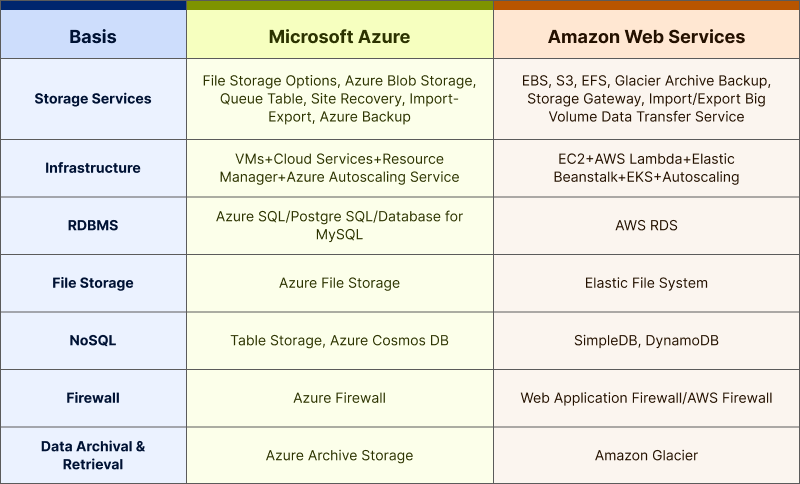
Cost & Pricing Structure
Price is always the most important consideration before initiating any purchase. Unfortunately, it’s hard to determine the exact pricing models for cloud deployment between solution providers. Azure and AWS have a no-cost tier model, i.e., per (m/h)-on-demand-pay-as-you-go-to-model. To help understand the pricing comparison among both, here’s a selection of a few variables influencing the whole pricing system.
- Subscription Model: Determined by minute, hour, second, month, or year.
- Payment Model: Depends on Pay-as-you-go-to service for both.
- Location: Datacentre location matters a lot to determine the cost.
- Virtual Machines: Depends on RAM requirements, number of instances (reserved+temporary), number of CPUs.
- Storage disks: Based on redundancy requirements, storage amount required, network-attached, locally attached data types.
- Support: Depends on which tier you opt for-for customization or for average monthly cloud spend.
The complexity of the pricing exponentially increases with each additional product/service you choose to opt for! Each provider’s billing approach with various layers of services and products may sometimes confuse professionals like AWS and Azure developers confuse at times.
Hence, only after deciphering the comparable technologies between Azure and AWS can a prospect be converted!

Development Tools
To formulate your business leveraging the benefits of these two reputed cloud providers, we’ve compiled a series of tools to guide you better. Azure has cognitive services with an API-supported suite integrating with Microsoft business and software apps. This sole, serverless platform helps to orchestrate every event-driven workload. E.g., Microsoft Edge is used for business analytics and management.
Again considering innovation and creativity, AWS has always been the digital transformation pioneer. It includes a Lex interface with AI/ML tools and 20 IoT facilities, including the ‘Alexa Technology.’ Also, the integration of a range of IoT enterprise custom solutions helps in the deployment of various cloud applications and programs.
This is how the comparison of the cloud platforms Azure and AWS are committed and efficient to technological advances.
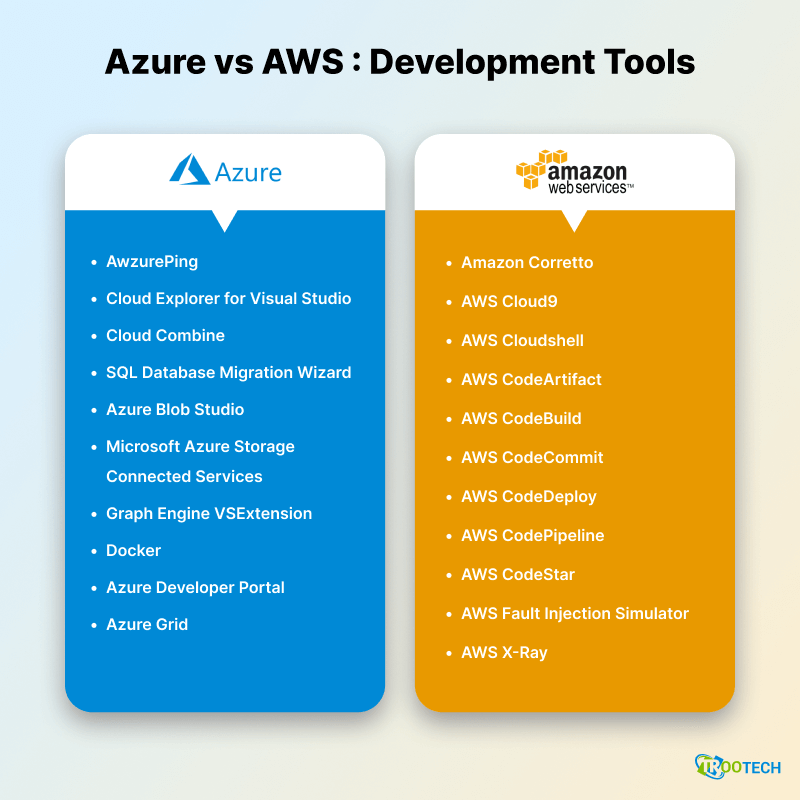
Other Specialized Developer Services
The extensive directories offered by Microsoft Azure serve as an ideal option for .net as well as Azure Developers. On the other hand, the healthier association of AWS with the open-source community helps Linux servers to make things easier for developers.
Check out this table below to get an in-depth knowledge of the specialized services provided by Azure and AWS, which are dabbled mostly with Quantum computing technologies.

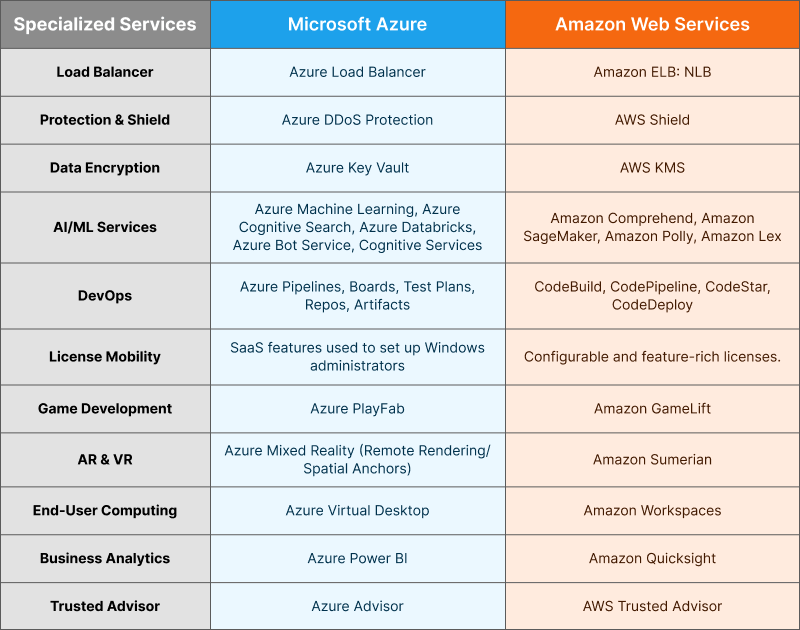
Choose Azure if
✔ Already use Microsoft tools like Office 365, Dynamics, SQL Server
✔ Need a hybrid cloud with on-prem infrastructure
✔ Operate in highly regulated industries (finance, healthcare, government)
✔ Want tight security, compliance, and predictable pricing
Choose AWS if
✔ Are building new SaaS or digital products
✔ Prioritize open-source, multi-language support
✔ Need global scalability and low-latency app delivery
✔ Want modular billing and maximum infrastructure flexibility
Need Help Deciding Between Azure and AWS?
Get a strategic cloud roadmap aligned with your cloud architecture
Why Enterprises Trust TRooTech
With over a decade of experience in enterprise-grade cloud development, TRooTech has empowered Fortune 500s and high-growth startups to modernize their infrastructure using both Azure and AWS. From data lake architecture to DevSecOps pipelines and cloud-native product builds, our expertise spans multiple industries and architectures.
Our value lies not just in implementation, but in strategic alignment. At TRooTech, we bring consultative thinking, architectural precision, and cross-industry knowledge to every cloud transformation. Whether it's enabling multi-cloud governance, optimizing cloud spend, or orchestrating secure migrations with zero downtime, we design infrastructure strategies that align directly with business outcomes.
- Certified Azure & AWS engineers
- End-to-end cloud migration & modernization
- Zero-downtime deployments with governance assurance
Next Steps:
- Need help building a cloud migration roadmap?
- Looking to optimize multi-cloud operations?
- Planning to modernize your digital stack?
AWS or Azure—Choose Cloud with Confidence
The choice between AWS and Azure is not about superiority, but about strategic alignment. AWS excels in speed, scalability, and developer agility—ideal for startups, SaaS products, and innovation-first enterprises. Azure, on the other hand, offers deep integration with Microsoft tools and unmatched hybrid capabilities—perfect for compliance-heavy, enterprise-grade ecosystems. The right decision depends on your business model, regulatory requirements, geographic priorities, and cloud maturity level.
At TRooTech, we help you move from cloud uncertainty to cloud clarity—offering platform-agnostic consulting and seamless execution. Whether you're migrating workloads, modernizing legacy systems, or architecting for future scale, our cloud experts ensure your infrastructure becomes a competitive advantage. Let us help you choose the platform that doesn’t just support your growth, but accelerates it.
FAQs
Microsoft Azure provides superior hybrid cloud support through Azure Arc, ExpressRoute, and integration with Microsoft compliance frameworks, making it ideal for sectors like healthcare, BFSI, and public enterprises. AWS, while hybrid-capable, is more suited for cloud-native or digital-first companies.
AWS offers granular billing with pay-as-you-go flexibility, ideal for innovation-driven teams and dynamic scaling. Azure, on the other hand, provides reserved instances and discounts for enterprises already licensed under Microsoft Enterprise Agreements, often resulting in predictable lower TCO in Microsoft-dominant IT environments.
AWS has a broader AI/ML service suite (SageMaker, Lex, Comprehend) and supports more customizable pipelines. However, Azure provides tighter integration with Microsoft tools and robust governance for responsible AI through Cognitive Services and Azure ML—ideal for regulated industries.
Azure has a larger footprint in compliance-heavy regions like Europe and the Middle East with services aligned to GDPR, HIPAA, FedRAMP, and more. AWS offers similar coverage but is preferred for its agility in launching new compliance services faster. Decision hinges on your industry and geography.
Key risks include data transfer complexity, downtime during replication, security reconfiguration, and architecture mismatches. TRooTech mitigates these risks via cloud-agnostic architecture design, CI/CD automation, and phased cutovers with zero business disruption.


